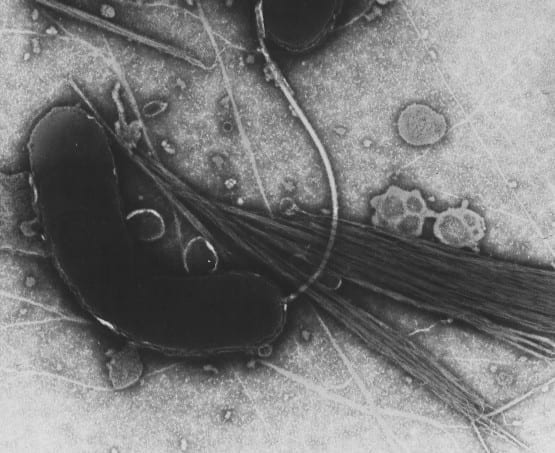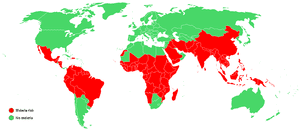
Can scientists rid malaria from the Third World by simply feeding algae genetically engineered with a vaccine?
That’s the question biologists at UC San Diego sought to answer after they demonstrated last May that algae can be engineered to produce a vaccine that blocks malaria transmission. In a follow up study, published online today in the scientific journal Applied and Environmental Microbiology, they got their answer: Not yet, although the same method may work as a vaccine against a wide variety of viral and bacterial infections.
In their most recent study, which the authors made freely available on the Applied and Environmental Microbiology website at http://aem.asm.org, the researchers fused a protein that elicits an antibody response in mice against the organism that causes malaria, Plasmodium falciparum, which afflicts 225 million people worldwide, with a protein produced by the bacterium responsible for cholera, Vibrio cholera, that binds to intestinal epithelial cells. They then genetically engineered algae to produce this two-protein combination, or “fusion protein,” freeze dried the algae and later fed the resulting green powder to mice. The researchers hypothesized that together these proteins might be an effective oral vaccine candidate when delivered using algae.
The result? The mice developed Immunoglobulin A (IgA) antibodies to both the malarial parasite protein and to a toxin produced by the cholera bacteria. Because IgA antibodies are produced in the gut and mucosal linings, they don’t protect against the malarial parasites, which are injected directly into the bloodstream by mosquitoes. But their study suggests that similar fusion proteins might protect against infectious diseases that affect mucosal linings using their edible freeze-dried algae.
“Many bacterial and viral infections are caused by eating tainted food or water,” says Stephen Mayfield, a professor of biology at UC San Diego who headed the study. “So what this study shows is that you can get a really good immune response from a recombinant protein in algae that you feed to a mammal. In this case, it happens to be a mouse, but presumably it would also work in a human. That’s really encouraging for the potential for algae-based vaccines in the future.”
The Latest Bing News on:
Medical Uses for Algae
- Holistic Vybez: Elevate Health With Sea Moss Gel Benefitson May 19, 2024 at 1:46 am
A true treasure of the earth, sea moss is an effective way to achieve holistic health. Black-owned family business Holistic Vybez harnesses the power of sea moss with top-quality products. Embraced as ...
- Earlier than normal toxic algae blooms bring safety concerns for SoCal residentson May 17, 2024 at 10:08 pm
Several Southern California lakes are being impacted by earlier than normal toxic algae blooms that could cause serious harm to humans and animals alike. Experts say that the natural algae blooms are ...
- Toxic algae blooms hit Inland Empire lakes, threaten people and petson May 17, 2024 at 12:29 pm
Officials fight back after advisories are issued at bodies of water in Riverside, San Bernardino and Los Angeles counties.
- Health alert issued for blue-green algae in Lake Okeechobeeon May 17, 2024 at 5:20 am
OKEECHOBEE, Fla. (CBS12) — Health officials issued an alert for the presence of harmful blue-green algae toxins in specific areas of Lake Okeechobee. The alert comes following water samples ...
- Stuart, 5 nonprofits urge EPA to set toxic algae standard as FL ignores water quality lawson May 17, 2024 at 2:22 am
EPA criteria could help water managers plan, protect and restore watersheds prone to toxic algae such as Lake Okeechobee, the St. Lucie and Caloosahatchee rivers, and Blue Cypress Lake in Indian River ...
- Health alerts issued for harmful algae blooms in several lakes around the Tampa Bay areaon May 16, 2024 at 1:11 pm
The Department of Health has issued a health alert for dangerous blue-green algae blooms in several lakes in the area.
- Algae Products Market to Reach $6.01 Billion by 2031 - Exclusive Report by Meticulous Research®on May 14, 2024 at 7:16 am
According to a new market research report titled 'Algae Products Market Size, Share, Forecast, & Trends Analysis by Type ...
- This Cooking Oil Is Made Using Algae—And TBH, It’s as Amazing (and Versatile!) as Olive Oilon May 10, 2024 at 5:59 am
A splash of olive oil is typically the first thing to hit the pan the moment I start cooking. With a smoke point of around 400ºF, a little bit of olive oil goes a long way—from kickstarting the ...
- Toxic algae alert issued for Lake Okeechobee, according to Martin County Dept. of Healthon May 8, 2024 at 1:27 pm
The Florida Department of Health in Martin County is cautioning the public of the presence of blue-green algae in areas of Lake Okeechobee on May 7. Water sample testing is underway. Results from the ...
- DOH warns public of algae in Lake Okeechobeeon May 8, 2024 at 10:24 am
Officials advise residents, visitors, and animals not to drink, swim, use personal watercraft ... not eat shellfish in waters with this algae, health officials said. However, eating fillets ...
The Latest Google Headlines on:
Medical Uses for Algae
[google_news title=”” keyword=”Medical Uses for Algae” num_posts=”10″ blurb_length=”0″ show_thumb=”left”] [/vc_column_text]The Latest Bing News on:
Edible Malarial Vaccine
- Plasmodium falciparum Malaria Vaccines in Developmenton May 17, 2024 at 5:00 pm
The development and implementation of a malaria vaccine would constitute a major breakthrough for global health. Recently, numerous new candidates have entered clinical testing, following ...
- mRNA malaria vaccine due for first clinical trialon May 17, 2024 at 2:26 am
Mahidol University has inched closer to starting the world's first clinical trial of an mRNA vaccine against malaria. Already tested on mice during a past laboratory trial, the vaccine candidate ...
- Malaria Vaccine: Why is it Taking so Long?on May 13, 2024 at 5:00 pm
Vaccines against malaria have been the object of constant endeavor by the scientific community and pharmaceutical industries for over three decades, with little success so far. Hopes for ...
- Reversing the relentless grip of malariaon May 7, 2024 at 5:00 pm
In Dielmo, on the banks of the Nema stream in Senegal, childhood was once marred by the relentless grip of malaria.
- Vaccines are a glimmer of hope against malaria, but the battle has only just begunon April 24, 2024 at 5:00 pm
In the quest for a vaccine, scientists have faced a Herculean challenge. The malaria parasite is a cunning shapeshifter, adept at evading the human immune system. Moreover, successfully ...
- Could new vaccines end malaria in Africa?on February 12, 2024 at 12:19 am
After decades of research and trials, a groundbreaking malaria vaccine is being rolled out across West Africa in a major attempt to eliminate the disease which is the second-biggest cause of death ...
- Edible vaccine successon November 21, 2023 at 11:16 am
ProdiGene (College Station, TX) announced in February that its patented edible vaccine confers protection against the common transmissible gastrointestinal virus in pigs. The vaccine, produced ...
- Shortage of malaria vaccines for kids who need it moston July 18, 2022 at 2:00 am
After decades of work, the World Health Organization (WHO) endorsed the first-ever malaria vaccine last year – a historic milestone that promised to drive back a disease that kills a child every ...
- A New Era in Hope and Health Equity: Malaria Vaccinationson November 2, 2021 at 2:17 pm
So, I was obviously ecstatic when the WHO announced its recommendation for widespread use of the first malaria vaccine on October 6, 2021. This RTS,S/AS01 (RTS,S) malaria vaccine is approved for ...
- Malaria vaccine biggest medical breakthroughon October 16, 2021 at 1:23 am
The world is celebrating the endorsement of the Malaria vaccine, which will go down as one of the greatest breakthroughs in medical industry. The vaccine is a product of 30 years of collaborative ...
The Latest Google Headlines on:
Edible Malarial Vaccine
[google_news title=”” keyword=”Edible Malarial Vaccine” num_posts=”10″ blurb_length=”0″ show_thumb=”left”]











